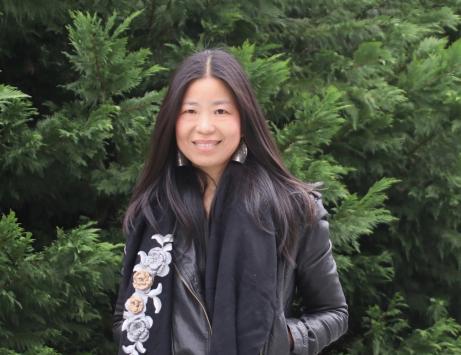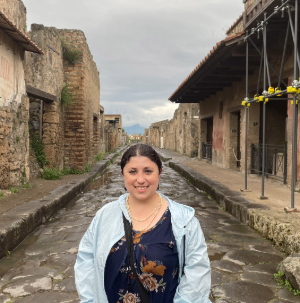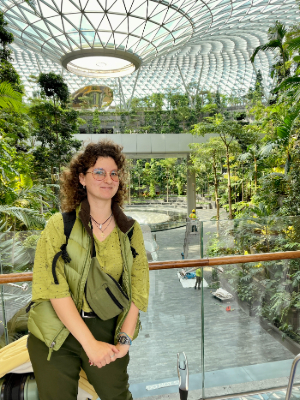Research Cafe: Yingchun Xu, Jessica Mingoia, & Ana Maria Oliynyk
Event Description
Research Cafe: February 21, 2024
3:00 - 4:00pm
On Zoom
Register in advance to receive the Zoom link
1.) "Traditions as Events: Phenomenological Bullhead Fish Hats and Hani (Akha) Sacred Swings Rebuilding" by Yingchun Xu, Media Studies

Abstract: Historically, indigenous traditions have long been considered backward, superstitious, and barbaric. The gradual disappearance of their cultural traditions is often accompanied by the termination of the production methods deemed as "backward" and the assimilation of their languages and education to adapt to modern social life. Originally the concept of tradition, literally from the Latin meaning "something handed over," in slowly changing societies was almost equivalent to inheritance. Alice Horner (1990) reminds us that tradition refers to the process of handing down from generation to generation, and something, custom, or thought process passed on over time. As a matter of fact, indigenous traditions have encountered cultural dislocation, such that sacred objects, customs, and rituals have been destroyed, eliminated, and alienated historically and globally. The question is: Are indigenous traditions recognized as a concept of time, mainly related to the "past" time or the obsolete, still suppressed unconsciously rather than appreciated by mainstream cultures? I argue that indigenous traditions should be practiced as events, a phenomenological “excess of signification (Garnet Butchart, 2011),” and a space frame of synchronicity. Based on two anthropological cases, Tlingit bullhead fish hats 3D repatriation from Smithsonian Institute, and Hani/Akha rebuilding and creation of their traditional swings, I analyze that the traditions as events through media show themselves rather than be shown, thereby forming spaces of indigenous people with their ancestors.
Speaker Bio: Yingchun Xu is a Ph.D. student in Media Studies at Rutgers. After exploring a wide range of disciplines in theories and being engaged in media-related work such as local TV, NGOs, and universities, her research focuses on media and indigenous culture, the political economy of digital media and cultural representation. Based on mixed methods including anthropological fieldwork, archival studies in museums such as in Smithsonian Institute, and discourse analysis, her research interests include the Hani case studies of China's ethnic “cultural root-seeking” as a resistance and cultural revival movement compared with the Akha case in Thailand, gender representation via media, and algorithm as a cultural technique.
2.) "In Pergula Natus: The Apartments of Pompeii and Herculaneum" by Jessica Mingoia, Art History

Abstract: Much of the sub-elite population of ancient Pompeii and Herculaneum resided in apartments. These non-elite residences are frequently found located inside spaces within one to two room commercial shops located on the ground floors. Sleeping quarters could be found in rear rooms or up ladders or steep staircases leading to mezzanine lofts (tabernae cum pergulis). Other apartments were accessed through exterior staircases leading to a separate upper story residence (cenacula). For much of the sub-elite population of ancient Pompeii and Herculaneum, sleeping in the same place where one worked was commonplace. Physical evidence of the existence of the living spaces within these shops can still be found in situ, including the imprints of long-vanished stairs on damaged walls, post-holes that once supported mezzanine lofts (pergulae), or carbonized wooden bed frames. In both cities, there are also large numbers of staircases which once led to independent upper story apartments above houses or public buildings. External staircase entrances and fragmentary remains of upper stories provide evidence for cenacula. Despite the prevalence of these apartments, which greatly outnumber houses, they are often overlooked in modern scholarship. Ancient scholarship also disparages these smaller residences and those who lived within them. This dissertation seeks not only to catalogue, map, and analyze these understudied residences using archaeological evidence, but also to tie the physical remains of these structures to ancient literary sources about these dwellings, their residents, and how both were viewed in the Roman world. Through this project, I will also endeavor to create a classification system of the archaeological variations of these residences to prove how greatly the size and features of these apartments could vary. I will also re-evaluate the relationship between non-elite apartments and their neighboring elite houses
Presenter Bio: Jessica Mingoia is a PhD candidate in art history specializing in Hellenistic and Roman art, architecture, and archaeology. Her dissertation, "In Pergula Natus: Apartments in Pompeii and Herculaneum'', will serve to survey and catalogue the non-elite apartments of these ancient cities, including their living conditions and features, relationship to elite neighbors, and prevalence within the urban fabric of the cities. Jessica is committed to improving DEI at Rutgers and is a member of the SGS Diversity, Equity, and Inclusion Graduate Student Advisory Committee. She is a passionate advocate for those with invisible disabilities and devoted to inclusive and equitable pedagogy. She also teaches undergraduate courses at Rutgers and other universities and is a contributor to Smarthistory. She has previously served as a co-editor and the advisory editor for the Rutgers Art Review, a graduate student-run art history journal.
3.) "Biophilia in the Urban Environment" by Ana Maria Oliynyk, Landscape Architecture

Abstract: As the global population becomes increasingly urbanized, the dissonance between traditional built landscapes and natural landscapes becomes increasingly loud, the disconnect between urban citizens and nature all the more significant. While the biophilia hypothesis postulates that humans are intrinsically connected with nature, and need nature for overall well being, the traditional urban landscape is not conducive to such a relationship. In response, biophilia urges the revitalization of the built environment by designing with this human-nature connection in mind. The landscape architecture profession, perhaps as no other, is uniquely positioned to bring this change to urban environments. Most have heard of, or experienced Central Park and the High Line. Through projects such as these, landscape architects have long been able to merge the stark contrasts between nature and the concrete jungle, but we have ways to go to redesign cities in a way where nature is not just an embellishment, but truly intertwined in the urban fabric.
Presenter Bio: Ana Maria Oliynyk is a Master of Landscape Architecture candidate at Rutgers, combining her passions for nature and the arts and pursuing her ambition for bridging the gap between people and nature through this program. With a background in studio art, photography, photojournalism, and environmental studies, she hopes to contribute to the landscape architecture profession by employing multimedia strategies to forward biophilia and green infrastructure in the design world, and to create such change through hands-on work as a future landscape architect. Ana Maria works with the Office of Urban Extension and Engagement, and is currently collaborating on a project to revive a community garden at Rutgers-Camden.
About Research Cafe
Research Café brings together the entire graduate student community of Rutgers University-New Brunswick/Piscataway campus to strengthen scholarly literacy and interdisciplinary research communication by providing a platform for budding researchers to connect, share their in-progress research or scholarship, and benefit from peer feedback in a friendly and low-stakes setting.
Research Café is a monthly, one-hour event occurring entirely on Zoom for the Spring 2024 semester. Each event will feature:
- Presentations (10-12 min. each) from two graduate students from across disciplinary areas ranging from engineering and biology to history and anthropology.
- A Q&A dialogue with peers and attendees.
Sign up to attend in person or on Zoom at https://grad.rutgers.edu/research-cafe.
---
Questions? Contact Briana Bivens at bb770@grad.rutgers.edu